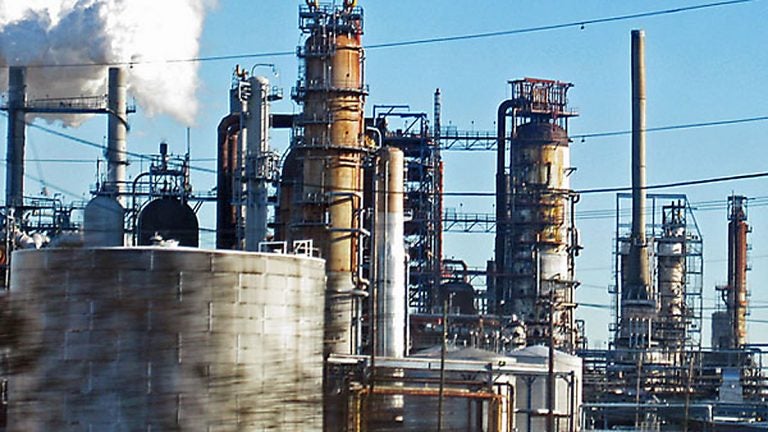NJ environmentalists on Exxon settlement: ‘It’s even worse than we thought’

After a week of withering criticism, the New Jersey attorney general’s office yesterday publicly announced a proposed settlement with ExxonMobil Corp. to resolve a more-than-a-decade-old pollution lawsuit for $225 million, far less than the $8.9 billion the state originally sought.
The proposed agreement, which needs to be approved by a state court, is more expansive than news accounts previously reported, covering the company’s former refineries in Linden and Bayonne as well as a refinery it once operated in Paulsboro. It also includes retail service stations and other facilities located throughout the state.
The deal, first reported by the New York Times last week, triggered protests from key lawmakers and environmental groups who have vowed to fight the agreement in court and in other venues. A press release — precise details of the proposed settlement have yet to be released — appears unlikely to quiet the storm.
State offices were closed yesterday because of inclement weather and calls to officials were not returned.
In a critical op-ed yesterday in the New York Times, former New Jersey Department of Environmental Protection Commissioner Bradley Campbell, who initiated the claim against Exxon, said he was advised that Gov. Chris Christie’s then-general counsel ‘’elbowed’’ the state attorney general’s office out of the long-litigated case to reach the settlement.
If true, Senate President Stephen Sweeney (D-Gloucester) told reporters yesterday he will demand an investigation by the U.S. attorney general’s office. Another prominent lawmaker called for the resignation of acting Attorney General John Hoffman.
“How do you turn an $8.9 billion damage claim, with liability already admitted, 11 years of litigation, and $100 million of expert fees into a $250 million (the figure originally reported in news accounts) settlement?’’ Sen. Raymond Lesniak (D-Union) asked.
The governor’s office released a statement calling Campbell’s allegations baseless. “The notion that this settlement represents something less than what is fair for New Jerseyans is absurd and baseless when you consider the facts of the settlement and Campbell’s prior comments on this case,” said Kevin Roberts, a spokesman for Christie.
When Campbell was DEP commissioner, he projected Exxon’s liability could run into the “hundreds of millions of dollars,’’ and said the case would likely have a reasonable basis to be settled than fully litigated, according to Roberts.
The Exxon case stemmed from a natural-resources damage lawsuit filed against the company for polluting 1,500 acres of marshes, wetlands, and waterways in Linden and Bayonne. A judge in the case already determined Exxon’s liability, but had yet to determine damages.
In announcing the proposed settlement, the attorney general’s office in a press release described it as the single largest environmental corporate defendant in New Jersey history, a claim quickly disputed by conservation groups.
Just this past year, New Jersey settled natural resource claims on the lower Passaic River for $355 million, according to Debbie Mans, executive director of the New York and New Jersey Baykeeper.
Hoffman said the proposed settlement comes on top of Exxon Mobil’s separate obligation to clean up the contaminated sites in Linden and Bayonne.
“It ensures the continuation of the Exxon Mobil-funded remediation work at these contaminated sites, and it holds the company financially accountable through payment of a historic Natural Resources Damage settlement on top of Exxon’s obligation to clean up the sites,’’ Hoffman said.
Not happy
But Mans said a big part of the proposed $8.9 billion settlement was to excavate and remove contaminants from the two sites. “They are pushing to leave the material and cap it and leave,’’ she said. “It’s even worse than we thought.’’
Jeff Tittel, director of the New Jersey Sierra Club, agreed. “This is even a bigger sellout of the taxpayers and the environment,’’ he said. “When you think it can’t get worse, it does.’’
Beyond the three refineries, the proposed settlement covers 16 additional facilities operated by Exxon and its retail service stations, some of which have contaminated drinking water. The state said it will pursue claims relating to contaminants in federal court.
Under the agreement — at least according to the press release — money from the settlement will not be diverted to plug a hole in the state budget as environmentalists feared, although it could happen in the next fiscal year.
Once the proposed settlement is finalized, it will be published in the New Jersey Register on April 6 and then be subject to a 30-day public comment period. It then would be submitted to the judge who presided over the case.
____________________________________________
NJ Spotlight, an independent online news service on issues critical to New Jersey, makes its in-depth reporting available to NewsWorks.
WHYY is your source for fact-based, in-depth journalism and information. As a nonprofit organization, we rely on financial support from readers like you. Please give today.




